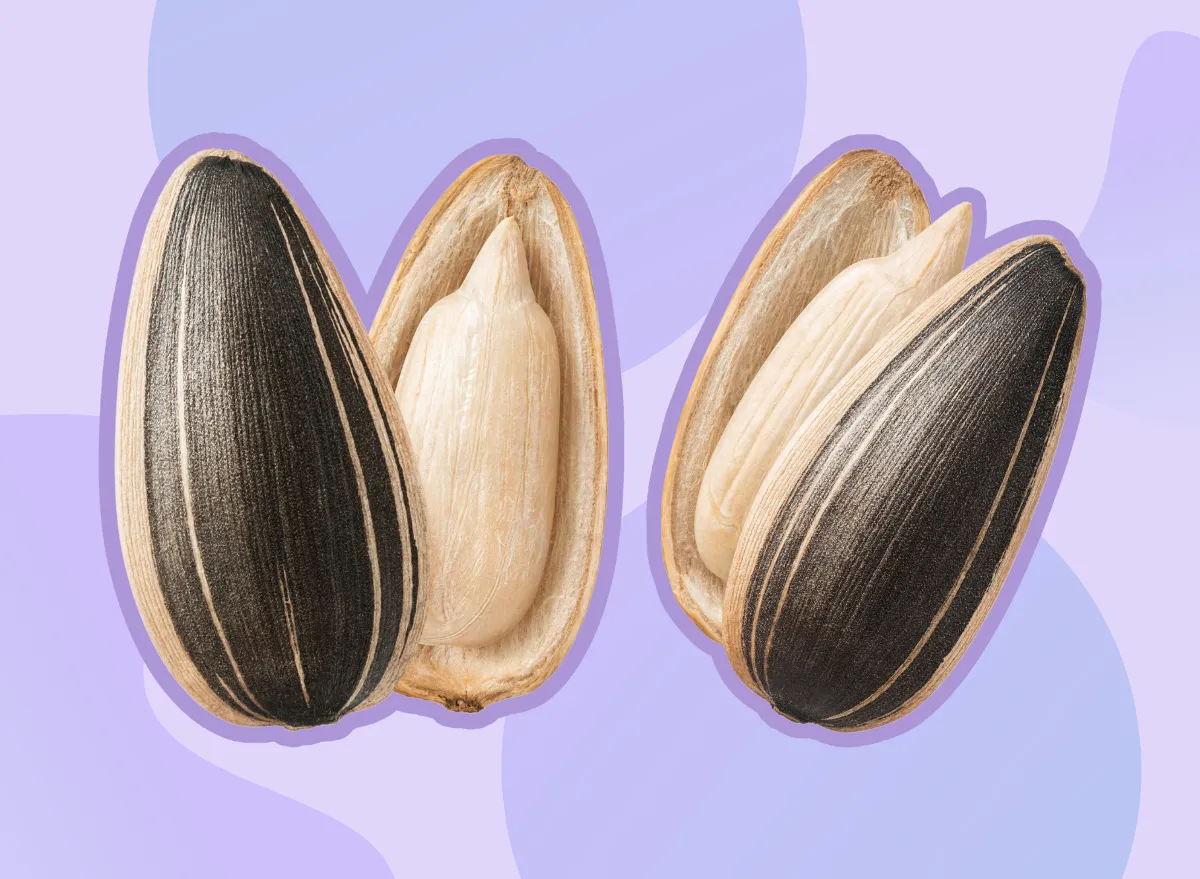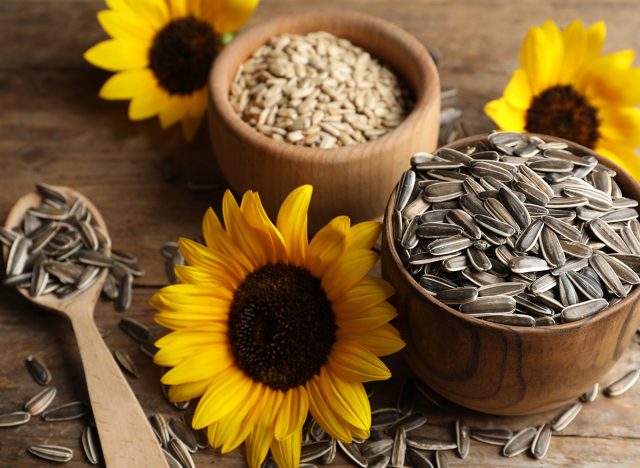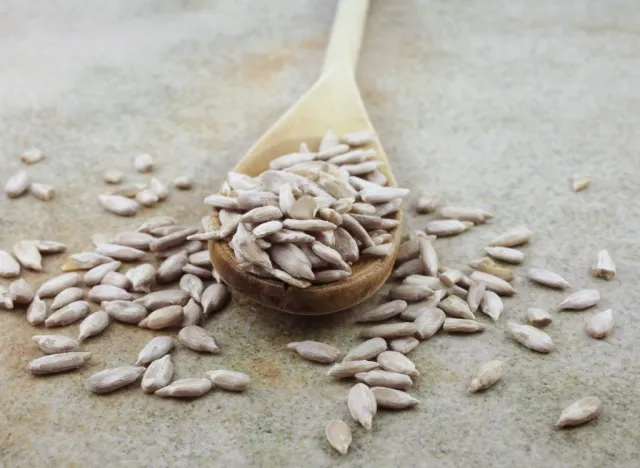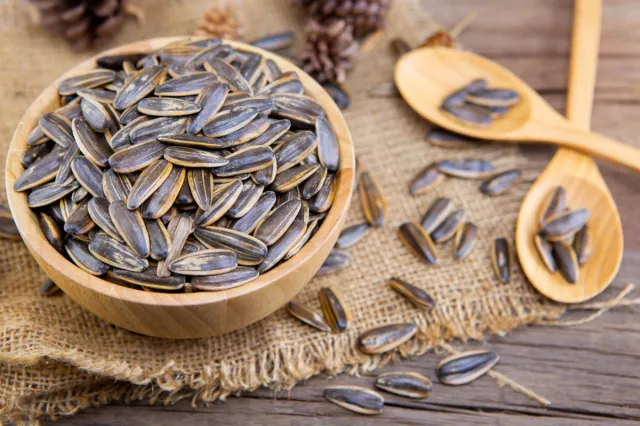Are Sunflower Seeds Healthy? 8 Benefits You Should Know

Whether you prefer them shelled or unshelled, roasted or raw, sunflower seeds are a versatile snack enjoyed by millions of Americans each year. From adding a crunchy bite to trail mixes, salads, and baked goods to being a classic ballpark treat, these tiny seeds are more than just a tasty snack.
Packed with nutrients that can support heart health, boost immune function, and deliver a rich source of antioxidants, sunflower seeds provide impressive health benefits that make them a worthy addition to your diet.
To learn more about the benefits and potential downsides of sunflower seeds, we talked to registered dietitians who revealed the secrets of these often overlooked seeds so you can make an informed dietary choice to boost your overall health.
Sunflower Seeds Nutrition Facts

Calories: 205
Fat: 18 g (Saturated fat: 2 g)
Sodium: 3 mg
Carbs: 7 g (Fiber: 3 g, Sugar: 1 g)
Protein: 7 g
Read on to discover the pros and cons of eating sunflower seeds.
Sunflower Seeds Benefits

They're an Excellent Source of Plant Protein
"Like other nuts and seeds, sunflower seeds are a good source of protein," says Destini Moody, RDN, CSSD, LD, a registered dietitian and sports dietitian with Garage Gym Reviews. Studies suggest that plant protein can support heart health, aid in weight management, and reduce chronic disease risk. "Just one ounce of sunflower seed kernels contains 7 grams of plant-based protein," Moody says. "Not only can this help vegans and vegetarians meet their protein needs, but the combination of protein and the high content of healthy fats make sunflower seeds a satiating and satisfying snack."
They Can Support Healthy Skin
Sunflower seeds are more than just a tasty snack; they can be a boon for skin health. "The vitamin E in sunflower seeds helps protect skin from damage caused by UV rays and environmental pollutants," explains Gianna Masi, CPT, RDN, a certified personal trainer and registered dietitian with Barbend. "The essential fatty acids in sunflower seeds help keep the skin feel hydrated and give some a healthier glow."
They Can Help You Eat Less
Sunflower seeds can help manage portion sizes and reduce calorie intake. "Seeds, by nature, are high in fat, which makes them calorie-dense," Moody explains. "However, if you buy shelled sunflower seeds, peeling and unshelling them can significantly slow down how quickly you consume these little guys, thus helping you portion control."
They're Rich in Fiber
"One cup of sunflower seeds contains 12 grams of fiber, which is a large chunk of your daily fiber needs. This is a great benefit because fiber helps us feel fuller longer and can help our cholesterol levels and heart health," Masi says. According to the National Institutes of Health, the fiber found in sunflower seeds can aid digestion by preventing constipation and supporting regular bowel movements.
They Can Aid in Healthy Weight Gain
"Seeds are high in a type of fat called polyunsaturated fats that can promote better heart health," Moody says. "Due to their high-fat content, one ounce of sunflower seed kernels contains about 204 calories. You can quickly eat one ounce of kernels in just one handful, depending on who you are."
They're High in Magnesium
"Magnesium is an important mineral for several bodily functions, including nerve regulation, cramping, and mood," Masi says. "Magnesium is also important for bone health. Coming in at 455 milligrams per cup, a serving of sunflower seeds helps meet your daily magnesium targets."
They're a Good Source of Vitamin E
Vitamin E plays a pivotal role in maintaining excellent overall health. "Vitamin E is a powerful antioxidant that fights inflammation in the body and can help protect the body's cells from oxidative stress," Moody explains. "Vitamin E may help reduce the risk of heart disease. When it comes to sunflower seeds, you can get 38 percent of your daily vitamin E needs from eating just one ounce of kernels."
They Can Boost Your Immune System
"Sunflower seeds also contain selenium, an important nutrient in our immune health. Alongside a healthy diet and proper sleep, this ingredient can help strengthen your immune system," Masi says.
Potential Drawbacks of Eat Sunflower Seeds

They're Calorically Dense
"Sunflower seeds are a convenient, portable snack, but their caloric density means that even a small serving contains a significant amount of calories that can lead to an unintentional surplus. Eating too many can lead to unintended weight gain over time," Moody cautions.
They Contain a High Amount of Omega-6s
Research shows that balancing omega-6 and omega-3 fatty acids is crucial for maintaining overall health. Unfortunately, sunflower seeds are exceptionally high in omega-6s, which can throw this delicate balance out of whack.
Masi explains, "While omega-6s are essential, an excessive intake relative to omega-3 fatty acids can contribute to inflammation and increase chronic disease risk. Ensure you're consuming other fats containing omega-3s, such as salmon, flax seeds, chia seeds, or walnuts."
They Can Be High in Sodium
It's always a good idea to be mindful of sodium intake, especially when enjoying salted sunflower seeds. Moody points out that "many commercially available sunflower seeds are salted," which can contribute to excessive sodium consumption if not monitored carefully.
"While sodium in the diet is not a bad thing, too much overtime can lead to unwanted side effects. Keep your daily total of sodium in mind when consuming sunflower seeds. Aim for 2,300 milligrams of sodium per day, as per the USDA. High sodium intake can lead to elevated blood pressure and increase the risk of cardiovascular disease. If sodium is a concern for you, try opting for lightly salted or an unsalted variety of sunflower seeds," she says.
Are Sunflower Seeds Healthy?

Sunflower seeds are nutrient-packed and offer several health benefits. They're rich in plant-based protein, fiber, and healthy fats that can support heart health, improve skin, and boost your immune system. Additionally, they provide key nutrients like magnesium, vitamin E, and selenium. While they're high in calories and omega-6 fatty acids and can be high in sodium if you're buying a pre-seasoned version, the benefits outweigh the drawbacks for most people. With mindful consumption, sunflower seeds can be a healthy addition to your diet.
- Source: Hertzler, S. R., Lieblein-Boff, J. C., Weiler, M., & Allgeier, C. (2020). Plant Proteins: Assessing Their Nutritional Quality and Effects on Health and Physical Function. Nutrients, 12(12), 3704. https://doi.org/10.3390/nu12123704
- Source: DiNicolantonio, J. J., & O'Keefe, J. (2021). The Importance of Maintaining a Low Omega-6/Omega-3 Ratio for Reducing the Risk of Autoimmune Diseases, Asthma, and Allergies. Missouri medicine, 118(5), 453–459.









